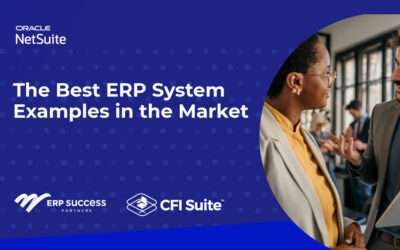Disparate systems usually lead to messy, disorganized business processes that rely too heavily on manual input, legacy software and applications that work in their own silos. Transferring information across these systems requires both spreadsheets and manhours, the latter of which are highly valued in a world where employees are hard to find and even harder to keep.
Quick service restaurants (QSRs) are well aware of these pain points and are always looking for new ways to do more with less. In many cases, a cloud enterprise resource planning (ERP) platform supported by an implementation partner that understands the QSR sector is the recipe for success.
Managing Multifaceted Business Models
With multiple restaurants or “stores” across the US, QSRs often run their operations on QuickBooks, maintain stock (and as such, need reliable inventory management systems) and likely manage warehousing responsibilities with their franchise partners.
Throttled by manual systems, these companies lack real-time visibility over food costs and can’t always make the best decisions as a result of this visibility gap.
Because it takes financial teams a week or more to gather the necessary financial data from QuickBooks to do their month-end closes, by the time they get the information they need it’s virtually useless. Other key challenges QSRs face include:
- A lack of organizational and data transparency
- Major time and resource constraints (particularly in the current labor shortage)
- Inability to accurately review and control costs
- Thin wholesale margins
- No way to profitably grow and scale
By bringing their end-to-end operations onto NetSuite, QSRs can eliminate these pain points while also streamlining their operations, automating previously-manual processes and creating much higher levels of visibility and transparency for their organizations.
“ERP systems have become table stakes for businesses looking to use resources wisely,” NetSuite says. “They can help leaders reallocate human and financial capital or build more efficient core business processes that save money without sacrificing on quality or performance.”
Supporting Good Planning and Coordination
An ERP also helps QSRs manage planning and coordination—two things that are extremely difficult to do using disconnected software systems, spreadsheets and manual processes. Using NetSuite, for example, restaurant managers have an accurate, up-to-date view of all available inventory and orders. They can compare supplier purchase orders and forecast future demand.
If necessary, managers can also make quick adjustments to head off problems. “ERP software improves communication and collaboration as well because workers can check on the status of other departments to guide their own decisions,” NetSuite points out. ERP also provides reports and analytics that can be difference-makers for a QSR.
“Turning a vast trove of information into charts and graphs that clearly illustrate trends and help model possible results,” NetSuite adds, “is an ERP capability executives find invaluable.”
Sales, Cost of Goods & Resource Management
An integrated, all-encompassing solution like NetSuite also helps QSRs manage across multiple different stores, effectively bringing their store networks onto a single platform that everyone can access in the cloud. Month-end close happens faster, managers and franchisees have all of the information they need at their fingertips, and the home office can quickly generate reports that would have previously taken weeks (or even months) to develop and distribute.
With NetSuite, all of a QSR’s information is housed in a single database, resulting in more accurate and up to date cross-departmental communications. A centralized system, NetSuite precludes each department from having to develop and update separate spreadsheets (and then share them with others via email). Data only has to be entered once in the ERP, which means better data integrity, security and backups.
Even better, NetSuite migrations can take place on a phased-in approach and don’t have to be a single, disruptive event. Restaurants can start only with what they need and then add new modules or integrations as the need arises.
Focusing on What Matters
An implementation partner that’s managed many successful NetSuite implementations in the QSR industry, ERP Success Partners helps multi-location restaurants get the biggest benefits from their ERP investments. For QSRs, NetSuite handles sales, cost of goods and resource management processes—the “big three” pain points that all restaurants are focused on.
For example, any company that’s still using QuickBooks lacks the real-time sales and financial data that it needs to operate profitably. With NetSuite, QSRs also get the Commissary Kitchen, which utilizes point of sale (POS) data to determine the volume of sales being generated by a specific outlet.
When they adopt NetSuite, QSRs can move away from manual processes, bring all of their operations onto a single ERP and effectively control their subsidiaries without spending too much time or money on their backend processes. With their backend processes automated, companies can focus on the front end, where the real money is made.






